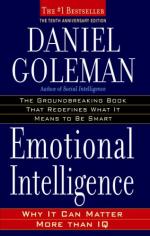
|
| Name: _________________________ | Period: ___________________ |
This test consists of 15 multiple choice questions and 5 short answer questions.
Multiple Choice Questions
1. Psychologist John Lochman designed a program to retrain aggressive boys in what?
(a) Anger management.
(b) Fear conditioning.
(c) Verbal development.
(d) Deferred gratification.
2. According to the author in “Part Three: Chapter 9, “Intimate Enemies,” boys honor independence while girls treasure what?
(a) Survival.
(b) Confidence.
(c) Rationality.
(d) Connectedness.
3. The neocortex in humans is _____ than in other species.
(a) Less pronounced.
(b) More pronounced.
(c) Larger.
(d) Smaller.
4. T. Berry Brazelton found through research that a child's readiness for learning is based on seven key factors. Which is the first of these?
(a) Curiosity.
(b) Confidence.
(c) Cooperativeness.
(d) Relatedness.
5. What, like other chronic negative emotions, increases the risks of complications during recovery from illness or surgery, according to the author in “Part Three: Chapter 11, Mind and Medicine”?
(a) Dyspareunia.
(b) Hypomania.
(c) Depression.
(d) Schizophrenia.
6. T. Berry Brazelton is a pediatrician from what institution?
(a) The University of Alabama.
(b) The University of Kansas.
(c) Yale University.
(d) Harvard University.
7. Dr. David Spiegel studied women in the advanced stage of what disease?
(a) Glaucoma.
(b) Breast cancer.
(c) Alzheimer's.
(d) AIDS.
8. Dr. Charles Nemeroff is best known for his work in treating what?
(a) Depression.
(b) Paraphilia.
(c) Pyromania.
(d) Ekbom syndrome.
9. Hilda Bruch pioneered the study of eating disorders that identified the two-part cause. What was the first part?
(a) Girls with eating disorders were enraged and under stimulated.
(b) Girls with eating disorders could not distinguish one feeling from another.
(c) Girls with eating disorders were compassionate and uncoordinated.
(d) Girls with eating disorders felt ashamed and were unable to feel compassion.
10. Though it was long believed that the thalamus sent signals to the neocortex that then went to the amygdala, research by what neuroscientist discovered a direct connection from the thalamus to the amygdala?
(a) Ulf Dimberg.
(b) Jerome Kagan.
(c) Joseph LeDoux.
(d) Dolf Zillmann.
11. Dr. John Gottman and a colleague identified the three most toxic parenting styles. Which is the second discussed in Part Four: Chapter 12, “The Family Crucible”?
(a) Being too laissez-faire.
(b) Ignoring feelings altogether.
(c) Over acknowledgment of feelings.
(d) Showing no respect for the child’s feelings.
12. Dr. John Gottman and a colleague identified the three most toxic parenting styles. Which is the third discussed in Part Four: Chapter 12, “The Family Crucible”?
(a) Over acknowledgment of feelings.
(b) Being too laissez-faire.
(c) Showing no respect for the child’s feelings.
(d) Ignoring feelings altogether.
13. According to researchers in “Part Three: Chapter 9, “Intimate Enemies,” girls learn what faster than boys, and therefore become more skilled at expressing and reading emotions?
(a) Temperance.
(b) Language.
(c) Exaggeration.
(d) Anger.
14. Children who are disciplined irregularly or based on the mood of the parents learn what that can follow them through life, according to the author in Part Four: Chapter 12, “The Family Crucible”?
(a) Confidence.
(b) Empathy.
(c) Aggression.
(d) Distress.
15. According to studies by Richard Davidson, people who were cheerful in temperament showed more activity in what part of the brain?
(a) The hippocampus.
(b) The left pre-frontal lobe.
(c) The olfactory lobe.
(d) The limbic system.
Short Answer Questions
1. Sensitivity to prejudice has been addressed with what in an attempt to prevent lawsuits and conflict on the job?
2. Engineers at Bell Labs were studied to see how well teams of 5 to how many could work together?
3. Marriages that began in 1890 suffered a divorce rate of what percentage, according to the author in Part Three: Chapter 9, “Intimate Enemies”?
4. What psychologist tracked 200 couples identifying significant signs that predict which marriages will fail based on how they handle disagreements?
5. According to the author in Part Four: Chapter 13, “Trauma and Emotional Relearning ,” what can help lessen the length and intensity of emotional responses or emotional hijackings, reshaping the brain to stand down from the constant state of emergency?
|
This section contains 592 words (approx. 2 pages at 300 words per page) |

|




